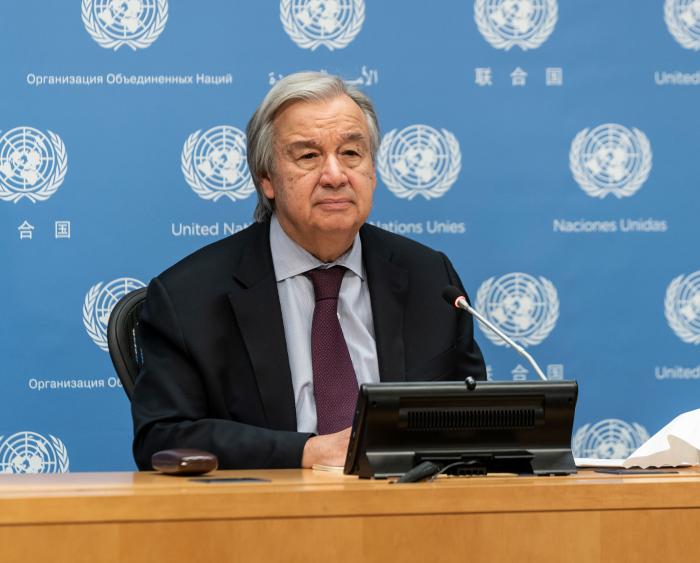WASHINGTON (SONNA):UNSecretary-General Antonio Guterres is set to assume his second term after member states voiced resounding confidence in his ability to helm the international body.
Guterres led the UN during the worst public health crisis in its history, guiding the international community through the coronavirus pandemic as it disrupted life across the globe and led to more than 3.8 million deaths.
Shortly after the General Assembly lent their approval for Guterres to begin another five-year term in 2022, he noted the daunting challenges facing the international community, saying “we are truly at a crossroads with consequential choices before us.”
“Paradigms are shifting, old orthodoxies are being flipped and we are writing our own history with the choices we make right now,” he said in the General Assembly hall. “It can go either way: break down and perpetual crisis, or breakthrough and a prospect of a greener, safer and better future for all.”
Much of that shift has manifested during Guterres’ first term in office as nationalism has made inroads worldwide at the cost of the multilateralism embodied by the UN.
That was certainly the case during former US President Donald Trump’s four-year term in office as he worked to withdraw Washington from UN agencies he deemed ineffective and repeatedly cast doubt on the UN’s effectiveness amid an increasingly multi-polar world.
But the surging rise in nationalism has not been confined to US borders. It has been on the uptick in nations, including Russia, India, China and the Philippines, among others.
That has compounded difficulties in getting consensus for the multi-faceted challenges facing the UN, including the coronavirus pandemic and the increasingly manifest threats posed by climate change and growing geopolitical divides.
Addressing reporters shortly after he was confirmed to a second term, Guterres said the challenges “must be addressed, bringing together our capacity to work at a global level.”
He emphasized that tasks before the UN requires a greater emphasis from member states on multilateralism, rather than nationalism, and said nations must “understand that each country alone can do nothing, that independently of the divisions that exist, countries must come together.”
“If we remain divided, the impossible will remain impossible, and the fragilities of this world will translate themselves into bigger suffering for the people, especially the most vulnerable,” he said
Guterres’ tenure at the helm of the UN aligned closely with Trump’s ascent to the White House and much of his first five years had been focused on keeping the US in the UN’s fold with varying success. Washington accounts for roughly one-fifth of the UN’s funding, making it an invaluable component of the 193-member body.
With President Joe Biden assuming office in January after defeating Trump, the US has moved to return to full participation in the UN, alleviating at least one major burden for Guterres.
But even with that largely out of the way there is no shortage of major tasks ahead for Guterres.
None are more pressing for the UN chief than the global coronavirus vaccine push as viral variants continue to spread worldwide amid persistent and extreme inequity in vaccine access.
Guterres pushed the G7 group of wealthy nations during their meeting last weekend to adopt a global vaccination plan at the larger G20 level with the support of the World Health Organization and the UN’s public-private vaccine partnership.
Companies in G7 member states have created the most effective vaccines to date, and they have so far largely benefited the developed world.
The plan Guterres proposed should be “designed to make vaccines available to everybody everywhere sooner rather than later,” he said.
That “means doubling the production capacity, having an equitable distribution, and supporting states to administer the vaccines when they get them and, third, that this plan is not only designed but is effectively implemented,” he said.
“We need to align power and leadership. Unfortunately, in today’s world, many times, those that have power have no leadership, and those that have leadership have no power,” he added.
While the global vaccine rollout will likely continue to dominate the secretary-general’s agenda in the short term, the more sweeping challenge he and the international community face from climate change is certain to persist throughout Guterres’ upcoming term.
His first five years have so far largely been focused on getting nations to recognize the climate crisis and enact carbon emissions reforms balked at by some leaders, including Trump, who moved to withdraw the US from a landmark 2016 pact aimed at mitigating the slowly unfolding disaster.
But those commitments to limit global warming to well below 2 degrees Celsius from pre-industrial levels have been deemed insufficient by climate scientists who are now warning that even if temperature rise is capped at 1.5 degrees Celsius there will still be dire consequences.
Guterres will have to continue his push to move countries toward curbing their carbon emissions in his next five years — a task that is all but certain to be passed on to his successor.





